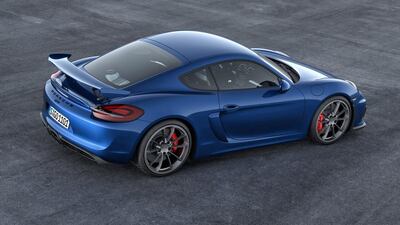For more than 50 years, Porsche's 911 has been the epitome of great sports cars. But no more. With the arrival of the Cayman GT4 at the start of this year, Porsche has signalled the beginning of the end of an icon.
Well, that’s not what the press release says, obviously. But the introduction of a super-focused Cayman will, I suspect, show up the 911 for what it is – a relic of a bygone age, albeit one that’s been evolved and improved superbly over the decades.
The fundamental problem is that the 911 is built wrong. The engine sits behind the rear axle. From a dynamic point of view, that’s a silly place to put it. There are advantages – more interior space; increased traction thanks to the weight on the rear tyres – but when the 911 is in motion around corners, the heavy engine acts like a pendulum, constantly wanting to swing the car around. It’s inherently unbalanced.
Porsche’s engineers have worked wonders over the history of the 911, turning it into a superbly handling machine. But there’s only so much you can do against the laws of physics.
Ironically, the original 1960s 911 could well have been mid-engined. Its creator, Ferry Porsche, came up with the mid-engined, two-seater 356/1 prototype in 1948 – the first “real” Porsche. It was only when practicality came to mind, with the need to sell a car with four seats, that the engine was moved back for production. That set the template for future road cars. But look at Porsche’s purpose-built race cars through the years – the ones not based on road cars – and most, if not all, have had the engines in the middle, simply because it works better.
When the Cayman was first introduced in 2006, its engine was mid-mounted, behind the driver but in front of the rear axle, which created a much more stable platform. From the start, the Cayman was lauded for its handling aplomb, but ever since, there’s been the sneaking suspicion that Porsche was holding back its potential; because if it gets too good, it starts to show up the 911. Consequently, even the hottest Cayman models have had relatively modest power outputs, so as not to tread on the heels of the mildest 911 Carrera.
But now the Cayman GT4 has its stamping boots on. Behind its seats is the same 3.8L, flat-six engine seen in the 997-generation 911 Carrera S, pushing out 380bhp – more than the current 911 Carrera. It has upgraded kit all over it compared to the standard Cayman, including bigger brakes, a big rear wing and a limited-slip differential. Although no road tests have been published yet, I’ll put money on it handling more progressively, and more confidently, at the limit than a 911. It will be the driving enthusiast’s Porsche of choice, aided by the lack of paddle-shift option – only manual gearboxes will be fitted to the GT4. Take that, auto-only 911 GT3.
Why has Porsche finally relented and allowed the Cayman to run free? My speculation is that the powers-that-be see the writing on the wall. Rumours have abounded for years that future 911s will be mid-engined, and/or a new model will be introduced ahead of the 911 and below the 918, with its power plant in the “right” place.
If that happens, where does the 911 sit? It’s no longer the fastest Porsche or the best to drive. Leave it to the 918 and the yet-to-be-announced model to deliver ultimate power and speed, while for ultimate driver involvement, it looks like the Cayman GT4 will be the king in 2015. For all its incredible history, is there a legitimate future for the 911?
motoring@thenational.ae
Follow us @LifeNationalUAE
Follow us on Facebook for discussions, entertainment, reviews, wellness and news.

